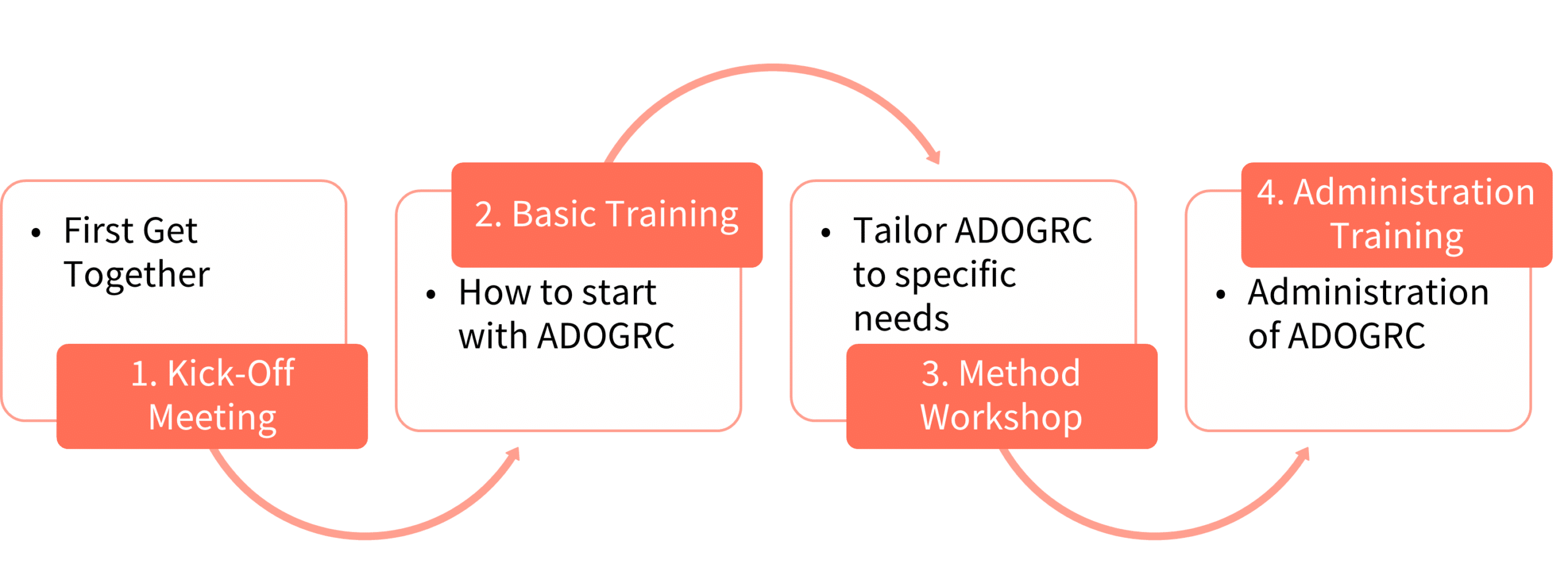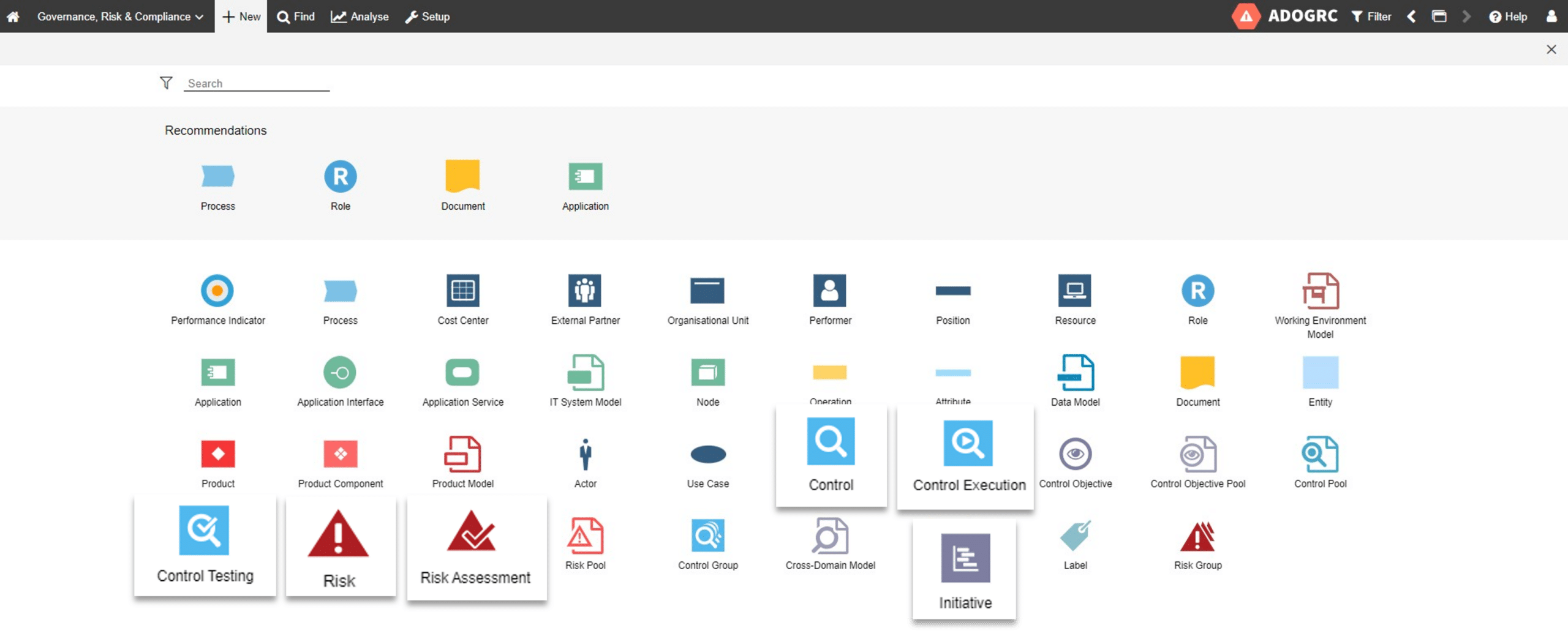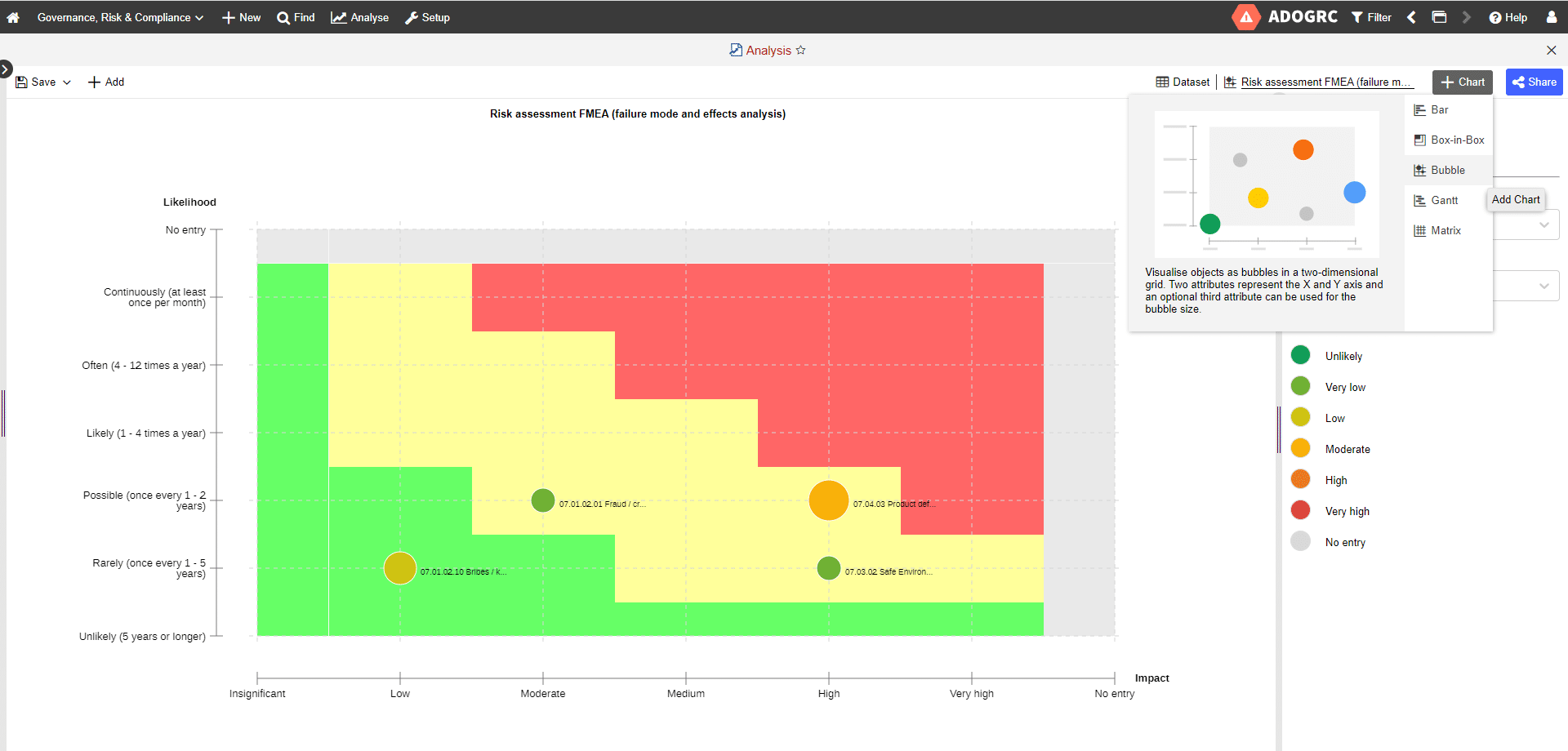Found this helpful? Share it with peers.
Introduction
As you embark on your ADOGRC journey, it’s natural to wonder what’s in store and how to make the most of this powerful suite solution. Whether you’ve just acquired ADOGRC or are simply keen to understand our approach to GRC implementation, this article is your trusted compass for the road ahead. We will delve into the crucial phases that follow your ADOGRC acquisition, ensuring you’re well-prepared for your ADOGRC experience. From the initial kick-off meeting to in-depth training sessions, we’re here to provide you with valuable insights, setting you on the path to harnessing the full potential of ADOGRC.

4 Steps to Successful GRC Implementation
Kick-Off Meeting
At the core of any successful project lies a great kick-off meeting. This initial gathering provides a platform for introductions, aligning goals, and establishing a rapport that forms the bedrock of a trustful partnership. To start on the right foot, we recommend keeping the kick-off relatively intimate, involving essential team members like project leads. During this meeting, roles and responsibilities are clarified, ensuring transparency and efficient cooperation.
Then, our focus shifts to your acquired suite package. We will dive into the details of what is included in the offer, clarifying features and services to eliminate any potential misunderstandings. From there, we delve into the heart of the meeting: the overall project plan. This encompasses various phases, from initial setup to post-launch support. Additionally, we discuss the content of contracted training sessions and workshops designed to help you get the most out of the suite.
Working collaboratively, we will create a well-defined schedule with milestones and deadlines. This proactive approach helps us keep a watchful eye on progress and ensures everything stays within the agreed-upon timeframe. In closing, we will set the initial dates for project implementation, including the first training sessions, discussing whether they should be conducted on-site or remotely, always aligning with your preferences for an optimal learning experience.
In essence, the kick-off meeting serves as the launchpad for a successful collaboration, fostering trust, clarity, and a solid foundation for the GRC implementation. In the next section, we provide an overview of what you can expect from our basic training.
Basic Training
Our basic training is a pivotal step in ensuring that you can make the most of ADOGRC. We recommend that you allow sufficient time for the basic training. Typically, two days of 8 hours each are required. The basic training should be attended by all colleagues who will be working intensively with ADOGRC in the future.
This comprehensive training program comprises five key components, each crucial to your understanding and effective utilization of the platform:
1. Introduction to the ADOGRC Metamodel
In this foundational session, we introduce you to the metamodel of ADOGRC. Don’t be daunted by the term; it simply refers to the complete set of elements, also known as repository objects, that are available to you in ADOGRC and that you will be working with. A little fun fact: Some clients even call it the ADONIS or ADOGRC universe (and yes they are right, there are almost no limits!). So, in general, we give you a thorough overview of all the objects and common functions, how to use them, and guide you through the user interface to ensure that you quickly become proficient in navigating our suite.
ADOGRC Repository Objects
2. Risk Management
The second component of the basic training is dedicated to risk management. Here, we focus on two primary objects: “Risk” and “Risk Assessment”. You will gain a deep understanding of how to create risks and risk assessments, manage relevant data fields, and link these objects within ADOGRC, e.g. to processes, controls, applications and so on. Both objects come with workflows, which we will also explore in detail, as they are really helpful in terms of getting your things done on time and keeping track of tasks.
3. Internal Control System
Our third module is centered around the internal control system, which includes objects like control, control execution, and control testing. We will explain how to create these objects and discuss available data fields for their specification. Of course, three different workflows are also available here to simplify data maintenance and reduce the overall effort.
4. Initiative Management
The fourth module deals with initiative management. Initiatives are like projects in their own right that are initiated, implemented and completed. So the main difference between initiatives and controls in ADOGRC is that controls are repetitive. All in all, the purpose of this module is to explain the creation of initiatives and the use of associated workflows. Pro tip: Initiatives can work seamlessly with the ADOGRC extension Strategy & Performance Management and thus contribute positively to the achievement of goals.
5. Analysis and Dashboards
The last module is dedicated to a topic of great interest – analysis and dashboards. ADOGRC offers a variety of analysis options and pre-designed chart templates that we will show you. You will also have the flexibility to create custom views. Additionally, we will also look at the GRC Dashboard, which provides a personalized overview of all relevant GRC objects and insight into upcoming tasks.
Risk Assessment FMEA (Failure Mode and Effects Analysis)
In the following section, we will take a closer look at the methodology workshop, which plays a crucial role in tailoring ADOGRC to your organization’s specific needs.
Method Workshop
In addition to basic training, we offer a specialized method workshop aimed at tailoring ADOGRC to meet the specific requirements and working methods of your organization. This workshop is a vital step in ensuring that ADOGRC aligns seamlessly with your unique processes.
Together, we will tackle questions like:
- Do you need to add additional or different data fields?
- What steps should workflows involve, and how many?
- Does your organization require a different risk assessment logic?
- How should your folder structure be designed?
- What’s the best way to structure the authorization concept, following the Need-to-Know principle?
- Should pre-existing data be imported?
The method workshop is ideally scheduled after the basic training to provide ample time for you to consider these essential questions. We recommend allocating at least 8 hours to this workshop.
Administration Training
Now, let’s shift our focus to those individuals responsible for the administration of ADOGRC. It’s important to identify in advance who will manage the administration toolkit and necessary configurations. It is crucial that these colleagues participate in the administration training. As a general guideline, it’s recommended not to have more than two administrators to maintain efficient management.
Summary
Our comprehensive training and workshops are meticulously designed to ensure you extract the utmost value from ADOGRC. Our goal is to meet your expectations and support you every step of the way in your GRC implementation. The strong foundation laid during the kick-off meeting, coupled with detailed training and workshops, guarantees you are well-prepared to leverage the full potential of our suite. Your ADOGRC journey begins with a solid introduction and equips you with the knowledge and skills needed for success.








